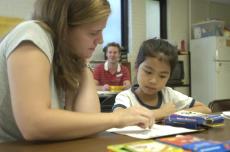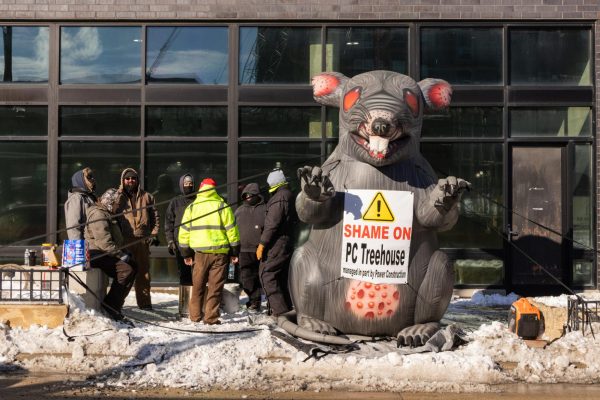Center responds to needs of refugee children

Claire Napier
Sep 20, 2004
The East Central Illinois Refugee Mutual Assistance Center has kept a low profile – until now. Since 1992, staff members and volunteers have provided counseling, translation services and a Saturday morning tutoring program at Urbana’s Unitarian Universalist Church for the children of immigrants and refugees. The staff’s hard work has paid off. The center will receive a humanitarian award from the City of Champaign and the Champaign-Urbana International Humanitarian Awards Steering Committee Sept. 27 for its contributions to the community and human rights relief.
The center takes in refugees – families running away from their native countries and applying for permanent U.S. residency, immigrants – legal U.S. residents that often come needing help with the English language, and asylees who come to apply for political asylum in the United States.
“We used to not make too much noise … we never used flyers, it was always word of mouth. It’s good to be recognized,” said Anh Ha Ho, co-director of the center. “Our mission has always stayed the same but the needs have broadened.”
The tutoring program for children of refugee families was a response to those needs. Staff members and volunteers help families place their children within the Champaign-Urbana school system and provide one-on-one tutoring. They also offer transportation to the church on a limited basis.
“We will pick up them up in cases of emergency,” Ho said, after mentioning a new car seat she bought for $7 at a garage sale in “very good condition” for the younger children the staff pick up. “Some don’t have the courage to wake up on Saturday morning.”
Get The Daily Illini in your inbox!
The program was started not only to help children with their schoolwork, but to teach them how to adapt to their new surroundings.
“We take them on field trips so they can use the skills they’ve learned,” said Jenny Crouch Clark, a program volunteer and University graduate student in social work.
The field trips, free of charge, have included trips to the Spurlock Museum, the Taste of Champaign-Urbana and the Farmer’s Market, where the children identified the fruits and vegetables they saw. The program also invites speakers to the church, including pet groomers, nurses and members of the University’s psychology department that offered sessions for the teenagers in the group on self-esteem and dealing with a new culture.
“We have to be creative,” Crouch Clark said. “We put our heads together … they enjoy everything.”
The program survives with the help of its volunteers. On Saturday, the service fraternity Alpha Phi Omega came to help out as volunteer tutors for the first time. They plan to make the program a weekly commitment, said Sergio Sosa, a junior in LAS and new member in the fraternity.
“It seemed like an interesting and cool thing to do,” Sosa said.
Sarah Cranston, a volunteer for the past three weeks, came to the center planning to work full time, but was asked to help as a tutor when there weren’t any openings.
“This is the first time I’m working with him individually,” she said of Audry Kiamana, a lively five-year-old that just started kindergarten and likes sticking Post-it notes on his tutors.
The tables during the program are divided by age and level in school. The children spend much of the morning working on homework from school, brushing up on their English and math, or putting together educational puzzles.
Jamie Walker, a volunteer and junior in LAS sat with Ngoc Nguyen, 11, a shy girl who sat quietly filling out a worksheet on American sports, and Vivia Diep, 10, who teased Walker about wanting to become a librarian instead of finishing her math problems.
“You should be one of those State Farm people,” Diep said. “You talk too much.”
The children, ages 4 to 18, are a diverse group from all over the world, including Liberia, Cameroon, Vietnam and Mexico.
Andre Mbassa, a University graduate student and volunteer from Cameroon, said the demographics of the children change often. Many children enrolled now are Congolese.
The Congolese make up a large portion of the center’s political asylees, Mbassa said.
“When someone knocks on our door, we always receive them with open arms,” Ho said. “We don’t have money to give out, or refuge or housing, but we provide guidance and counseling. We help introduce them to the American culture.”





